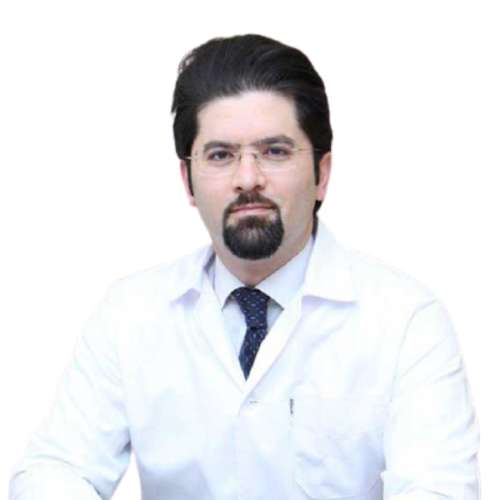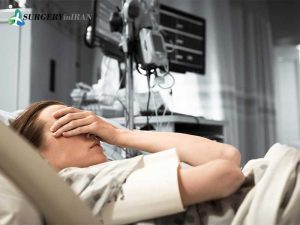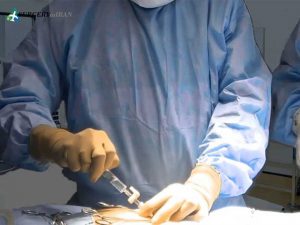Ectopic pregnancy or EP
Signs of ruptured fallopian tubes in ectopic pregnancy
Contraindications to methotrexate
Laparoscopic surgery and open abdominal surgery or laparotomy
Traditional medicine in ectopic pregnancy
Nutritional and motor care after surgery
Mental problems after ectopic pregnancy
When a fertilized egg is released from the ovary and travels to the uterus, it sometimes implants in the fallopian tubes and begins to grow in its path before reaching the uterus, which is usually two percent of pregnancies. And it occurs in the first weeks of pregnancy, called an ectopic pregnancy or EP, which stands for ectopic pregnancy, and is a rare and dangerous event for the mother. There is no scientific way to score this fertilized egg in medicine today. Does not exist and this fertile egg must be rid of as soon as possible.
Causes of ectopic pregnancy
Sexually transmitted diseases, including infections of the genital tract.
Taking contraceptives that contain progesterone.
EVF or the same artificial insemination that is done in the laboratory.
Pelvic surgeries for various therapeutic reasons
The IUD has the highest risk among these factors for ectopic pregnancy. (About 50%)
Tobacco use, which usually disrupts the function of the fallopian tubes.
Symptoms of ectopic pregnancy
In this type of pregnancy, it is possible that there are no signs and symptoms for the mother and, like a normal pregnancy, her symptoms appear, such as nausea, delayed menstruation, and breast and abdominal pain.
To ensure a normal pregnancy, a woman should see a specialist after any of the above symptoms to make sure her pregnancy is normal and not to risk it. If there are no symptoms other than the delay of the menstrual cycle, this issue should be followed more carefully to prevent the rapid growth of the fetus in the tube as soon as possible, because as we know, menstruation may be delayed for many reasons. Drop.
Signs of ruptured fallopian tubes in ectopic pregnancy
– Pain in the abdomen or pelvis
These pains are usually unilateral and accompanied by nausea and are exacerbated by the pressure of sneezing and coughing and may sometimes cause minor bleeding.
– Pain in the shoulder
This pain is one of the most common symptoms of this type of pregnancy. A person feels a lot of pain, especially when lying on his shoulders, because of the rupture of the fallopian tubes, which stimulates the nerves attached to the shoulders, and sometimes the pain becomes so severe that it is beyond the tolerance of the person.
– Weakness and fainting
If the fallopian tube ruptures, the person may become very weak and lethargic to the point of anesthesia, which should be called immediately to the emergency room and taken to the first medical center.
– Spotting
If you have this type of pregnancy, it is possible that you are constantly having a runny nose or light menstruation, which is very unusual and you should see a doctor immediately.
Diagnostic methods
The doctor can find out the type of pregnancy through a series of examinations and vaginal and abdominal ultrasounds and by examining the size of the uterus, ovaries, and tubes.
The doctor can also be informed of the problem by testing blood and urine and measuring hormone levels and comparing it with its standard amount in pregnancy or non-pregnancy.
If all of the above tests indicate pregnancy, but no fetal or fetal sac is seen on the ultrasound, the doctor will confirm the ectopic pregnancy.
Methotrexate is the only effective drug in the world that is prescribed to solve this problem. This drug is injectable and intramuscular and has a reasonable price and can be easily obtained from all pharmacies with a doctor’s prescription. The blood-injected substance reaches the fetal cells and prevents the growth of placental cells, destroying the fetus and causing it to be absorbed by the mother.
During this time, the patient should avoid taking painkillers such as acetaminophen and gel fen, etc., as well as vitamins and some supplements and alcohol and tobacco and sex to have a good time.
After a few days, the doctor will test again and check the level of HCG hormone until the level of this hormone reaches zero and announce the end of pregnancy. (This hormone is produced after pregnancy and from the placenta)
The patient should drink two to three liters of water a day after injection to minimize the renal side effects of this drug. Symptoms such as hypotension, diarrhea, hair loss, acne, drowsiness, and pulmonary embolism may occur after the injection and are very unlikely to occur.
Contraindications to methotrexate
– The fallopian tube is torn
Breastfeeding is dangerous for the baby.
– Liver and kidney patients whose diagnosis is with the relevant doctor.
Simultaneous uterine pregnancy, which is a rare occurrence.
If the doctor diagnoses one of the above problems or the fetus grows in the tube and the effects of the drug are delayed, the treating physician uses surgery, which is of two types.
Laparoscopic surgery and open abdominal surgery or laparotomy
In laparoscopy, the doctor enters the abdomen through a small hole in the umbilicus with a local anesthetic and observes the inside of the pelvis with a camera and solves the problem. But if the tubes are torn and the tube needs to be removed from the abdomen, open abdominal surgery is needed. In any case, at the discretion of the doctor, one of these methods is performed. If the fallopian tube is damaged, there is still no need to worry about getting pregnant again. Because only one pipe has a problem and there is still another pipe.
In addition, if the mother is Rh-negative, as in normal deliveries, there is no problem during the next deliveries after the Rh antibody is injected into the mother.
After abortion and surgery, up to 3 months should avoid pre-pregnancy so that the effect of the injectable drug is completely removed from the body and does not pose a risk to the next fetus.
Traditional medicine in ectopic pregnancy
Some mothers who believe in herbal and traditional medicine and do not want to be treated with chemical drugs go-to plants such as saffron, barberry, chamomile, etc. to destroy the sperm. Although these plants can sometimes be useful due to hormonal stimulation, the modern medical community has rejected even safe herbal methods and it is recommended to consult a specialist.
Nutritional and motor care after surgery
After discharge from the hospital, the patient should start his daily activity lightly, which can include a walk of about 10 to 15 minutes a day, which, depending on the physical strength of the person should be added to the time daily. Swimming can be very useful for this person, considering all the proper health tips. But as far as possible, avoid strength training for the first few weeks or months.
Nutrition also plays an important role in the patient’s recovery. In the first days after surgery, it is recommended to consume fluids such as apple and pineapple juice and light and laxative foods such as plain soup, chicken broth, meat, and fruits rich in fiber. The patient should avoid constipation as much as possible and avoid bloated foods.
Eating foods rich in iron, such as liver and supplements, can also greatly restore the blood lost during surgery.
Mental problems after ectopic pregnancy
Trying to get pregnant again after a failed pregnancy is a very sensitive and stressful issue. Problems such as anger, regret, loss of confidence, sleep problems, and emotional problems in marital relationships, all of which are due to hormonal disorders and are transient. Is. The person fears that this may happen again before he or she can become pregnant again, and unfortunately there is no way so far to assure you that this will not happen to you again. So it is better to get help from a psychotherapist during the same physical recovery period and do exercises such as yoga and meditation to regain the necessary preparation and all-round confidence for re-pregnancy.
















